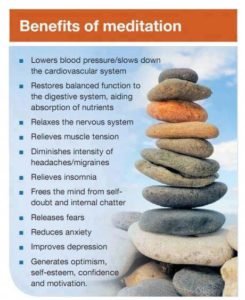Lose not the advantage of solitude, and the society of thyself. -Thomas Browne’

It is as important to cultivate your silence power as it is your word power. William James
Mindfulness Meditation Linked with positive brain changes
It Makes Your Brain Plastic
Quite literally, sustained meditation leads to something called neuroplasticity, which is defined as the brain’s ability to change, structurally and functionally, on the basis of environmental input. For much of the last century, scientists believed that the brain essentially stopped changing after adulthood. But research by University of Wisconsin neuroscientist Richard Davidson has shown that experienced meditators exhibit high levels of gamma wave activity and display an ability — continuing after the meditation session has attended — to not get stuck on a particular stimulus. That is, they’re automatically able to control their thoughts and reactiveness.
It Increases Gray Matter
A 2005 study on American men and women who meditated a mere 40 minutes a day showed that they had thicker cortical walls than non-meditators. What this meant is that their brains were aging at a slower rate. Cortical thickness is also associated with decision-making, attention and memory.
It Can Be Better Than Sleeping
In a 2006 study, college students were asked to sleep, meditate or watch TV. They were then tested on their alertness by being asked to hit a button every time a light flashed on a screen. The meditators did better than the nappers and TV watchers — by a whole 10 percent.
It’s Better Than Blood Pressure Medication
In 2008, Dr. Randy Zusman, a doctor at the Massachusetts General Hospital, asked patients suffering from high blood pressure to try a meditation-based relaxation program for three months. These were patients whose blood pressure had not been controlled with medication. After meditating regularly for three months, 40 of the 60 patients showed significant drops in blood pressure levels and were able to reduce some of their medication. The reason? Relaxation results in the formation of nitric oxide that opens up your blood vessels.
It Can Protect Your Telomeres
Telomeres — the protective caps at the end of our chromosomes — are the new frontier of anti-aging science. Longer telomeres mean that you’re also likely to live longer. Research done by the University of California, Davis’ Shamatha Project has shown that meditators have significantly higher telomerase activity than non-meditators. Telomerase is the enzyme that helps build telomeres, and greater telomerase activity can possibly translate into stronger and longer telomeres.
It Can Slow The Progression Of HIV
A 2008 study on HIV positive patients found that, after an eight-week meditation course, patients who’d meditated showed no decline in lymphocyte content compared with non-meditators who showed significant reduction in lymphocytes. Lymphocytes or white blood cells are the “brain” of the body’s immune system, and are particularly important for HIV positive people. The study also found that lymphocyte levels actually went up with each meditation session. However, due to the small sample size — only 48 volunteers — it’s harder to draw definitive conclusions.
It’s Pain Relieving Properties Beat MorphIne
Earlier this year, a study conducted by Wake Forest Baptist University found that meditation could reduce pain intensity by 40 percent and pain unpleasantness by 57 percent. Morphine and other pain-relieving drugs typically show a pain reduction of 25 percent. Meditation works by reducing activity in the somatosensory cortex and increasing activity in other areas of the brain. This study also had a small sample size, making it harder to draw definite conclusions.


